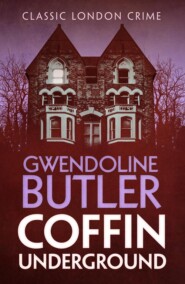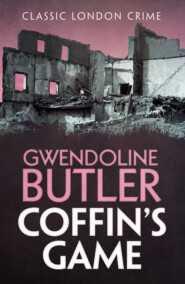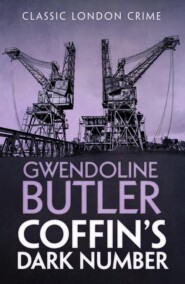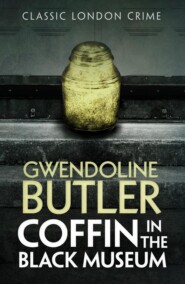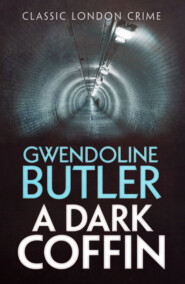По всем вопросам обращайтесь на: info@litportal.ru
(©) 2003-2024.
✖
A Coffin for Charley
Автор
Год написания книги
2019
Настройки чтения
Размер шрифта
Высота строк
Поля
He had his own remembrances of this district to contend with as well, some of them peculiar to say the least. He had lived here as a raw young copper with the woman that politely but falsely he had called ‘Mother’. She had asked him to do so. At the time he had understood that she was a distant relation of his father, a cousin, because the old lady who had certainly been his grandmother and the woman who had probably been his aunt and who had superintended what there was of his childhood, had assured him she was and that he should take rooms with her. People did that sort of thing then, now they lived in bedsits. She had been his mother’s dresser, or so she said, and was a bit mad.
She had given him ham for his supper and called it kippers and given him kippers and called it ham. But they had rubbed along all right. Every day he had travelled across to South London where he worked.
After a bit she had moved there to a flat above a shop in the Borough. Soon after this he emancipated himself. But he sat with her when she died in Guy’s Hospital. Died with some pain, still calling herself Mother. He had been the only mourner at her funeral and out of charity he had sent several wreaths in different names.
Never my true mother, but more of a mother than the other one.
He had come back to this district, then part of the Met, called in as a seasoned detective who was working on a similar case across the river, in time to hear Annie’s story and receive Lizzie Creeley’s confession. Where had Stella been then? Not with him, one of their early bitter partings.
His picture differed from both Lizzie’s and Annie’s because he had seen Annie and heard her tale, he had seen Lizzie and listened to what she had to say, while those two had never spoken face to face.
Annie remembered creeping out of the house on a foggy November night to go down the garden to what had been an old privy and now housed some pet rabbits to inspect her favourite Angora whom she suspected of eating her litter.
In the dark she had heard voices and movements. She had crawled to the hedge, kept wild and uncut, to see two people, a man and a woman, dragging out from the house the old couple who lived there. Before her terrified eyes, they were tumbled bloody and perhaps not even dead (so the pathologist had reported later) into a pit and the earth thrown over them.
It had taken her a week to tell what she had seen and longer still to identify Lizzie and Will. She had done so from behind a special window that allowed her to see them while they could not see her. She had been flanked by two social workers. One, a girl whose name she had forgotten, and the other a very young man, Alex Edwards, whose name she had never been able to mislay because he visited her often to this day. Several policemen had been present, one of whom was John Coffin.
Lizzie Creeley remembered hearing Annie’s written testimony read out in court and biting her lower lip till the blood ran. Her counsel hardly bothered to raise a question. She knew she was done for at that point. She wanted to kill him as well, and see that Annie got hers too if she could. She had signalled as much to her father sitting watching.
In court, she had cried out: ‘She’s lying, the little bitch,’ and been reprimanded by the Judge.
Coffin remembered Annie’s pinched and terrified face, and Lizzie’s fox-like fury, and never doubted the child’s truth for a moment.
But as he knew, there are truths and truths.
CHAPTER 3 (#ulink_4e885bfc-a5fa-5b36-9126-b8572d8a41c0)
The same Monday evening
The house where Annie Briggs now lived and where she had spent her short married life and from which her husband had left her (not for another woman but for what he called another life) was not far away from her childhood home from whose garden she had witnessed the two Creeleys bury the old man and woman. Looking back, she thought she could remember them striking blows as well. Hitting them on the head. Skulls splitting like eggs. Had she heard that?
Two deaths it had been, people forgot that, she told herself, when they talk about letting those horrors out. Talk about pity and compassion and people having served their time. Those two cannot serve their time; for what they did such time does not run. I ought to know. I was the one who saw, who heard.
And who testified.
She had hoped they would die incarcerated, but remembering.
Annie certainly intended to do her best to see that they did: on the anniversary of the killing she always sent them letters, one each, describing that night. People said that they did not get the letters, that the letters were intercepted, but she knew better. She knew they got to their destination, not to the heart, those two had not got hearts, but to their liver and guts where fear dwelt. She knew, she sensed it.
She was always sick herself on that day. It was interesting and might be no coincidence that on that anniversary day in her eleventh year she had started to menstruate and still kept that celebration with blood.
After hearing the killing in the garden of the two old people, she had been a ‘disturbed child’, a name she still wore like a label round her neck. A disturbed child is a disturbing child. Her parents had discovered that fact almost at once.
‘Not that I went in for any of that poltergeist nonsense,’ said Annie to herself. ‘Although I could have done, I could have worked it, but it’s stupid, that sort of thing.’
She had been anorexic, had tried a little thievery and gone in for a bit of arson. Nothing big, she wasn’t a big person, but certainly ‘disturbing’ if you had to live with it.
Then someone, a boy, told her she was pretty and she shed all the ‘disturbed’ symptoms overnight and grew up.
You cannot be a disturbed adult, not if you are looking for sympathy, you are meant to pull yourself together, or they give you pills or electric shocks or put you away, or a combination of all three, and Annie wasn’t having any of that. So she put that portmanteau of disturbance behind her, recognizing that it had been self-induced and not wholly satisfying.
Marriage she had enjoyed while it lasted. She was sad when it ended, not blaming Jack Briggs or herself, thus proving to her own satisfaction that she was grown up at last.
The house in Napier Street where Annie and her small daughter and her young sister, Didi, now lived was one of three tall, narrow houses. The top two floors had been formed into a separate flat, while Annie inhabited the bottom two. The top flat had its own front door reached by means of an iron fire escape of solid Victorian construction.
Miss Royal had rented the flat from Annie about eighteen months ago and had been an object of interest to Annie ever since. To the neighbours as well when they got a chance to view her.
Miss Royal was blonde, leggy, wore trousers almost all the time, which caused the unkind old neighbours next door, Nancy and Bob Tyrrett, to say she must be a lesbian, and they didn’t mean it as a compliment. The Tyrretts had watched her move in and kept their eyes open since but had not managed more than the odd fleeting glimpse. Miss Royal was a buyer in fashion for a large chain of department stores and not home a lot.
‘She has to travel a lot on business,’ Annie had explained to her sister. ‘But she finds it fascinating and loves it.’
‘She never says a word to me, just shoots past.’ Not that she had done that lately either. Must have wings, thought sister.
‘Well, she does to me. On occasion. When she feels like it.’
‘And she’s asked you to call her Caroline?’
‘Oh, everyone does that now.’
‘Does she call you Annie?’
‘Sometimes,’ said Annie, unwilling to admit that Miss Royal never did.
‘Does she have a man up there?’
Annie blinked. ‘Well, I’m her landlady, not her keeper. So what if she does? She’s adult.’
Didi frowned. ‘Thought I’d ask.’ She drank some coffee. ‘What sort is he?’
‘The usual sort, I suppose. Why?’
‘He looks,’ she hesitated … ‘different. I saw him once.’
‘Keep out of things,’ advised Annie. ‘She lives her life, let us live ours. Laissez-faire.’ A new phrase on Annie’s lips; she had left school too young and was now getting an education as a mature student. She knew who Metternich was, and Lord Palmerston, and had heard of Adam Smith.
Annie was doing a course at the local university, the new one, upgraded from a polytechnic. She had a small grant which just allowed her to eat while she studied Law and History but the great plus was that Maida, her child, went to the university children’s group daily.
She had read all about Marianna Manners’s murder even if she did not admit it. How could they think I was not interested in murder, I who know more about it than most.
‘I wonder if she’d talk to me if I went up,’ Didi speculated, more to see what Annie said than because she intended to try. ‘I need to talk to someone about fashion if I’m going in for drama. I haven’t got my image right.’
‘She told me she specialized in fashion for the older lady,’ said Annie. ‘But you could try.’
That means don’t bother, assessed Didi. As if I was going to, anyway.
The front doorbell rang.
‘Late,’ said Annie.’ I shan’t answer.’ She began to tremble.






